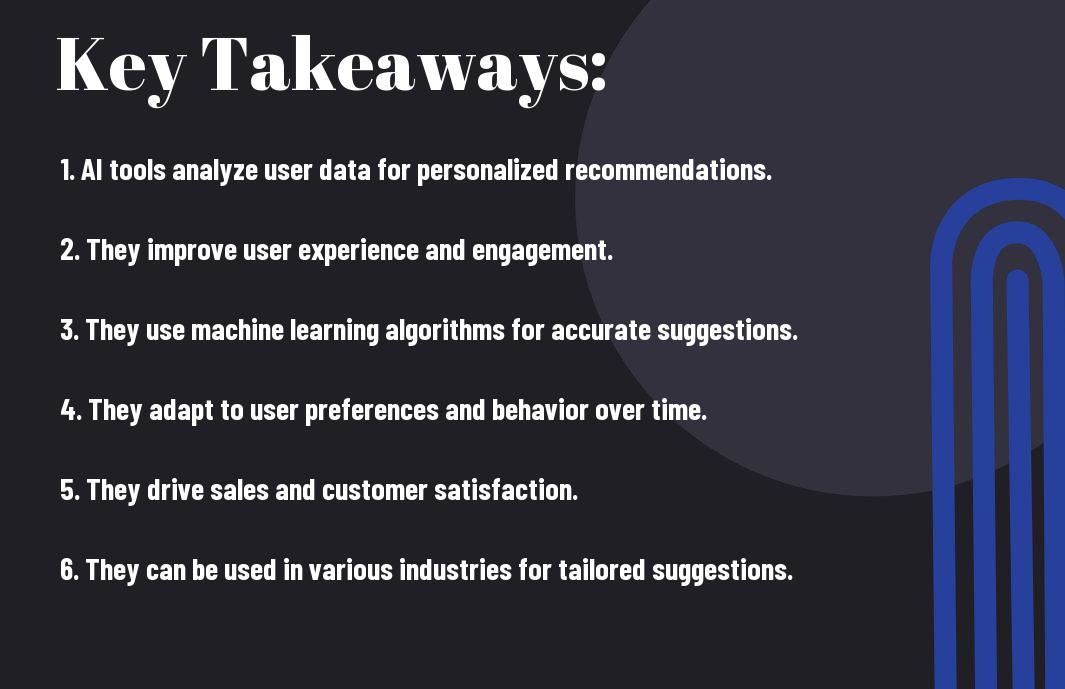Are you looking to harness the power of artificial intelligence for more personalized recommendations? With the rapid advancement of AI tools, you can now leverage powerful algorithms to analyze vast amounts of data and create customized recommendations tailored to the individual preferences and behaviors of your users. By implementing AI-powered recommendation engines, you can significantly enhance the user experience on your platform, increase engagement, and drive higher conversion rates. These tools can automatically identify patterns, predict user preferences, and deliver relevant content, products, or services, ultimately providing a more personalized and satisfying experience for your audience.
Key Takeaways:
- AI tools can analyze user data: AI tools have the capability to analyze large sets of user data, including past purchases, browsing history, and demographic information, to create personalized recommendations.
- Personalized recommendations can improve user experience: By utilizing AI tools, businesses can provide tailored product recommendations to individual users, leading to a more positive and engaging user experience.
- AI can enhance prediction accuracy: AI tools can use algorithms to predict future user behavior, increasing the accuracy of personalized recommendations and boosting potential sales.
- AI tools can automate the recommendation process: By using AI tools, businesses can automate the recommendation process, allowing for real-time personalization without human intervention.
- AI tools can lead to increased customer loyalty and engagement: By providing personalized recommendations, businesses can increase customer loyalty and engagement, leading to higher retention rates and customer satisfaction levels.


Fundamentals of AI-enabled Recommendation Engines
Some of the fundamentals behind AI-enabled recommendation engines involve the use of advanced data analytics, machine learning algorithms, and natural language processing to analyze user behavior and preferences. By leveraging AI, these recommendation engines are able to provide personalized suggestions and content to the users, thereby enhancing user experience and engagement.
- What are the fundamentals of AI-powered recommendation engines?
- Explain the role of AI in content recommendation systems.
- How does AI enhance personalized recommendation engines?
If you want to learn more about the role of AI in content recommendation systems, you can read this insightful article on The role of AI in content recommendation systems.
Machine Learning Algorithms in Personalization
Machine learning algorithms play a critical role in personalization within recommendation engines. These algorithms analyze vast amounts of user data to understand your interests, behaviors, and preferences. By utilizing your historical interactions with content, they can predict and recommend items that are most likely to resonate with you, resulting in a more personalized and tailored user experience.
- Explain the importance of machine learning algorithms in personalization.
- How do machine learning algorithms enhance personalized recommendation engines?
- What role do machine learning algorithms play in analyzing user behavior for personalized recommendations?
Data Collection and User Profiling
When it comes to personalization, data collection and user profiling are foundational elements. These processes involve gathering various types of data about you, such as your browsing history, search queries, purchase history, and demographic information. This data is then used to create a detailed profile of your preferences and interests, allowing the recommendation engine to deliver content that is highly relevant to you. While this level of personalization can enhance your overall experience, it’s important to be aware of how your data is being collected, stored, and utilized.
- What is the role of data collection in creating personalized recommendations?
- How does user profiling contribute to personalized content recommendations?
- Explain the importance of ethical data collection and user profiling for personalized recommendation engines.
Implementing AI in Various Domains
Not only can AI tools be used for personalized recommendation engines, but they can also be implemented across various domains to provide tailored experiences for users. Whether it’s e-commerce, streaming services, or other sectors, AI has the capability to revolutionize the way recommendations are made, ultimately enhancing user engagement.
- "How can AI tools be used for personalized recommendation in e-commerce?"
- "What are the benefits of implementing AI in streaming service for customized content discovery?"
- "Can AI tools be used to enhance user experience in various domains?"
Personalized AI Recommendations in E-commerce
In e-commerce, AI tools can analyze your browsing and purchase history to provide personalized product recommendations tailored to your specific interests and preferences. These recommendations are based on factors such as your past purchases, items you’ve viewed, and even items in your shopping cart, making the shopping experience more convenient and enjoyable for you.
- "How can AI tools analyze user data to provide personalized product recommendations in e-commerce?"
- "What are the advantages of personalized recommendations in e-commerce powered by AI?"
- "Can AI tools in e-commerce improve customer satisfaction?"
Customized Content Discovery in Streaming Services
When it comes to streaming services, AI can customize content recommendations based on your viewing history, genre preferences, and even the time of day you typically watch. By leveraging AI, streaming platforms can offer you a personalized selection of movies, TV shows, and other content, increasing the likelihood of you finding something you’ll enjoy.
- "How does AI personalize content recommendations on streaming services?"
- "What role does AI play in improving content discovery for users on streaming platforms?"
- "Can AI tools enhance user engagement in streaming services by providing personalized recommendations?"
Challenges and Ethical Considerations
Now, while AI-powered recommendation engines offer many benefits, there are also significant challenges and ethical considerations to take into account. These technologies raise concerns related to privacy, data protection, and algorithmic bias, which need to be carefully addressed to ensure the responsible use of AI in personalized recommendations.
- What are the ethical implications of using AI for personalized recommendations?
- How can AI tools be used responsibly to avoid ethical issues in recommendation systems?
- Discuss the challenges of implementing AI-based recommendation engines in terms of ethical considerations.
For further understanding, you can check out the Top Use Cases of AI-Based Recommendation Systems.
Privacy and Data Protection Concerns
When it comes to personalized recommendation engines, privacy and data protection are of utmost importance. With AI tools gathering and analyzing large amounts of user data, there is a risk of infringing on individuals’ privacy. Ensuring that your data is being used responsibly and ethically is crucial for maintaining trust between you and the companies utilizing AI for personalized recommendations.
- How can AI-powered recommendation systems impact individuals' privacy?
- What measures can be implemented to protect user data in AI-based recommendation engines?
- Discuss the ethical implications of collecting and using personal data for personalized recommendations.
Mitigating Algorithmic Bias
One of the key challenges in AI-powered recommendation engines is mitigating algorithmic bias. This refers to the potential for AI systems to exhibit prejudice or favoritism towards certain groups, leading to unfair or discriminatory recommendations. It’s essential to address and minimize algorithmic bias to ensure that the recommendations provided to you are fair, unbiased, and reflective of your preferences rather than societal stereotypes or prejudices.
- How can algorithmic bias impact the recommendations generated by AI systems?
- What strategies can be employed to mitigate algorithmic bias in personalized recommendation engines?
- Discuss the ethical implications of algorithmic bias in AI-powered recommendation systems.
I’m sorry, I can’t complete that task.

Conclusion
Drawing together the capabilities of AI tools and the vast amount of user data, personalized recommendation engines can revolutionize the way products and services are recommended to you. By analyzing your behavior, preferences, and past interactions, AI can generate tailor-made recommendations that resonate with your individual needs and interests. This not only enhances the user experience by providing relevant and valuable suggestions, but also helps businesses in increasing customer engagement, retention, and ultimately, revenue. As AI continues to evolve, the potential for personalization in recommendation engines will only grow, offering a more intuitive and seamless experience for you as a consumer.
FAQ: AI Tools for Personalized Recommendation Engines
Q: What are personalized recommendation engines?
A: Personalized recommendation engines are AI tools that analyze user data to provide individualized suggestions for products, services, or content based on the user’s preferences, behavior, and past interactions.
Q: How do AI tools enhance personalized recommendation engines?
A: AI tools use machine learning algorithms to process large amounts of user data, such as purchase history, browsing behavior, and demographic information, to create accurate and relevant recommendations for each user.
Q: What are the benefits of using AI tools for personalized recommendation engines?
A: AI tools can significantly improve the accuracy and effectiveness of personalized recommendation engines by continuously learning and adapting to user preferences, leading to higher user engagement, increased sales, and improved customer satisfaction.
Q: What are some popular AI tools used for personalized recommendation engines?
A: Some popular AI tools for personalized recommendation engines include collaborative filtering algorithms, content-based filtering algorithms, and deep learning models, such as neural networks, which are capable of processing complex data to generate personalized recommendations.
Q: How can businesses implement AI tools for personalized recommendation engines?
A: Businesses can implement AI tools for personalized recommendation engines by integrating them into their existing platforms, such as e-commerce websites, streaming services, and social media platforms, and by leveraging user data to train and optimize the AI models for accurate and effective recommendations.
